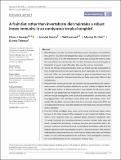Files in this item
A fruit diet rather than invertebrate diet maintains a robust innate immunity in an omnivorous tropical songbird
Item metadata
| dc.contributor.author | Nwaogu, Chima Josiah | |
| dc.contributor.author | Galema, Annabet | |
| dc.contributor.author | Cresswell, Will | |
| dc.contributor.author | Dietz, Maurine W. | |
| dc.contributor.author | Tieleman, B. Irene | |
| dc.date.accessioned | 2020-01-06T16:30:02Z | |
| dc.date.available | 2020-01-06T16:30:02Z | |
| dc.date.issued | 2020-03-06 | |
| dc.identifier | 262737477 | |
| dc.identifier | 955adcda-cb71-43c9-a0e8-bcc3f3c255ad | |
| dc.identifier | 85077888959 | |
| dc.identifier | 000505284400001 | |
| dc.identifier.citation | Nwaogu , C J , Galema , A , Cresswell , W , Dietz , M W & Tieleman , B I 2020 , ' A fruit diet rather than invertebrate diet maintains a robust innate immunity in an omnivorous tropical songbird ' , Journal of Animal Ecology , vol. 89 , no. 3 , pp. 867-883 . https://doi.org/10.1111/1365-2656.13152 | en |
| dc.identifier.issn | 0021-8790 | |
| dc.identifier.other | ORCID: /0000-0002-4684-7624/work/67167279 | |
| dc.identifier.uri | https://hdl.handle.net/10023/19228 | |
| dc.description | Experiments were funded by the Royal Netherlands Academy of Arts and Sciences (KNAW) Academy Ecology Fund to C.J.N—(KENMERK J1618/ECO/G437). C.J.N. was supported by a studentship funded by the Leventis Conservation Foundation through the University of St. Andrews UK and an Ubbo Emmius grant of the University of Groningen, The Netherlands. B.I.T. was supported by the Netherlands Organisation for Scientific Research (NWO‐Vidi 864.10.012). | en |
| dc.description.abstract | 1. Diet alteration may lead to nutrient limitations even in the absence of food limitation, and this may affect physiological functions, including immunity. Nutrient limitations may also affect the maintenance of body mass and key life history events that may affect immune function. Yet, variation in immune function is largely attributed to energetic trade-offs rather than specific nutrient constraints. 2. To test the effect of diet on life history traits, we tested how diet composition affects innate immune function, body mass and moult separately and in combination with each other, and then used path analyses to generate hypotheses about the mechanistic connections between immunity and body mass under different diet composition. 3. We performed a balanced parallel and crossover design experiment with omnivorous common bulbuls Pycnonotus barbatus in out-door aviaries in Nigeria. We fed 40 wild-caught bulbuls ad libitum on fruits or invertebrates for 24 weeks, switching half of each group between treatments after 12 weeks. We assessed innate immune indices (haptoglobin, nitric oxide and ovotransferrin concentrations, and haemagglutination and haemolysis titres), body mass and primary moult, fortnightly. We simplified immune indices into three principal components (PCs), but we explored mechanistic connections between diet, body mass and each immune index separately. 4. Fruit fed bulbuls had higher body mass, earlier moult and showed higher values for two of the three immune PCs compared to invertebrate fed bulbuls. These effects were reversed when we switched bulbuls between treatments after 12 weeks. Exploring the correlations between immune function, body mass and moult, showed that an increase in immune function was associated with a decrease in body mass and delayed moult in invertebrate fed bulbuls, while fruit fed bulbuls maintained body mass despite variation in immune function. Path analyses indicated that diet composition was most likely to affect body mass and immune indices directly and independently from each other. Only haptoglobin concentration was indirectly linked to diet composition via body mass. 5. We demonstrated a causal effect of diet composition on innate immune function, body mass and moult: bulbuls were in better condition when fed on fruits than invertebrates, confirming that innate immunity is nutrient specific. Our results are unique because they show a reversible effect of diet composition on wild adult birds whose immune systems are presumably fully developed and adapted to wild conditions – demonstrating a short-term consequence of diet alteration on life history traits. | |
| dc.format.extent | 1627923 | |
| dc.language.iso | eng | |
| dc.relation.ispartof | Journal of Animal Ecology | en |
| dc.subject | Environmental change | en |
| dc.subject | Immunomodulation | en |
| dc.subject | Life-history trade-offs | en |
| dc.subject | Nutrient limitation | en |
| dc.subject | Path analyses | en |
| dc.subject | Vegetarians | en |
| dc.subject | QH301 Biology | en |
| dc.subject | DAS | en |
| dc.subject | BDC | en |
| dc.subject | R2C | en |
| dc.subject.lcc | QH301 | en |
| dc.title | A fruit diet rather than invertebrate diet maintains a robust innate immunity in an omnivorous tropical songbird | en |
| dc.type | Journal article | en |
| dc.contributor.institution | University of St Andrews. School of Biology | en |
| dc.contributor.institution | University of St Andrews. Centre for Biological Diversity | en |
| dc.contributor.institution | University of St Andrews. Scottish Oceans Institute | en |
| dc.contributor.institution | University of St Andrews. Institute of Behavioural and Neural Sciences | en |
| dc.contributor.institution | University of St Andrews. St Andrews Sustainability Institute | en |
| dc.identifier.doi | https://doi.org/10.1111/1365-2656.13152 | |
| dc.description.status | Peer reviewed | en |
| dc.date.embargoedUntil | 2020-01-03 |
This item appears in the following Collection(s)
Items in the St Andrews Research Repository are protected by copyright, with all rights reserved, unless otherwise indicated.

